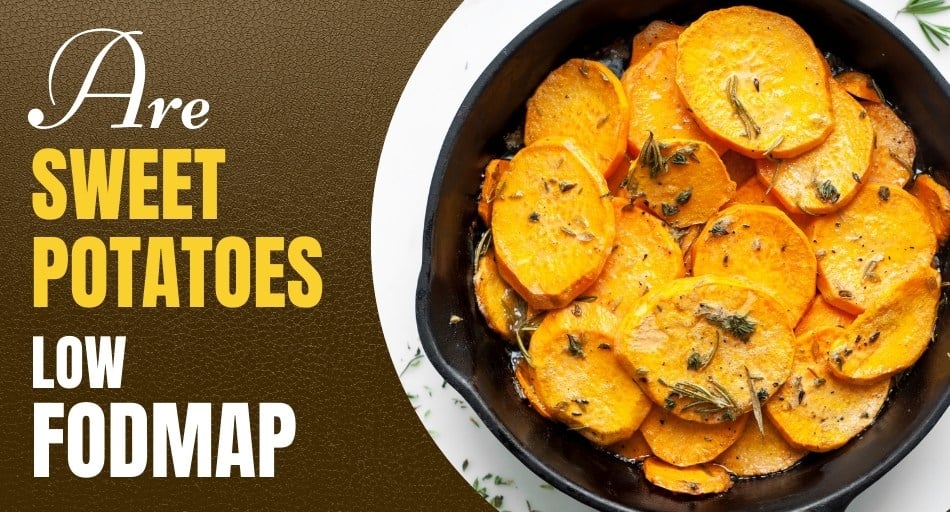A low FODMAP diet is often recommended for people struggling with irritable bowel syndrome (IBS). FODMAPs are indigestible carbs that can cause digestive system problems for people who are particularly sensitive to them.

When you’re following this diet, it’s important to know which popular foods are low in FODMAPs and which aren’t.
For example, let’s think about sweet potatoes. While they’re rich in various nutrients and antioxidants, are there suitable for an IBS-friendly diet?
Table of Contents
Are sweet potatoes low in FODMAPs?
In moderate servings, sweet potatoes are low in FODMAPs, so they can be consumed by people on a low FODMAP diet. They don’t contain too many indigestible carbs, so they shouldn’t cause any issues for people dealing with IBS.
What’s more, sweet potatoes are an excellent source of fiber, vitamins, minerals, and antioxidants – all of which contribute to good health and disease prevention.

So, even small quantities of sweet potatoes can be a wonderful addition to your diet.
How low in FODMAPs are sweet potatoes?
A standard serving of sweet potatoes, ½ cup (75 g), is considered to be low in FODMAPs, thus safe for people on a low FODMAP diet and those with IBS. So, if you stick to this serving, you can safely consume sweet potatoes.
Keep in mind, though, that sweet potatoes still do contain FODMAPs. So, if you consume more than the above-mentioned serving, you can experience unpleasant, IBS-related symptoms.
Can you eat sweet potatoes on a low FODMAP diet?
Sweet potatoes are allowed on a low FODMAP diet as long as it’s in a serving of ½ cup (75 g).
This serving is low in FODMAPs, so you’re unlikely to experience any IBS flareups or other digestive system issues.
It also might be best to bake sweet potatoes as opposed to frying or boiling them. This not only ensures that you’re getting a portion of food that’s low in FODMAPs but also as high in other nutrients as possible.
Are canned sweet potatoes low in FODMAPs?
Generally, canned sweet potatoes can be consumed in the same serving sizes as freshly baked sweet potatoes.
But remember that it only applies to sweet potatoes canned in regular brines, as there are also varieties canned in syrup.

Such syrups often contain lots of glucose and fructose, which are categorized as FODMAPs. So, sweet potatoes canned this way aren’t suitable for a low FODMAP diet.
Are fried sweet potatoes low in FODMAPs?
Fried sweet potatoes aren’t higher in FODMAPs than baked sweet potatoes. But they are higher in calories and fats, as they’re usually fried using butter or cooking oil.
So, if your goal is also losing weight, you might want to stick to oven-baking your sweet potatoes to avoid intaking too many calories from unhealthy fats.
Are sweet potatoes healthy?
Sweet potatoes are a starchy vegetable, so they provide you with a lot of calories from carbohydrates.
In fact, a one-cup serving of baked sweet potatoes contains 6.6 g of fiber, which equals 26% of your daily recommended need for this nutrient.
Sweet potatoes contain two types of fiber: soluble and insoluble. Soluble fiber absorbs water and helps move food through your digestive tract. On the other hand, insoluble fiber doesn’t absorb water and prevents indigestion.

So, the fiber in sweet potatoes is beneficial in different ways.
A single one-cup serving of sweet potatoes also packs nearly eight times as much vitamin A as you need per day.
This fat-soluble micronutrient protects your eyes from nighttime blindness and age-related macular degeneration. It also works as an antioxidant, so it protects you against certain types of cancer.
Since it’s a fat-soluble nutrient, it’s important to consume vitamin A-rich foods with a good source of healthy fats to ensure proper absorption.
What’s more, sweet potatoes contain 65% of your daily need for vitamin C in a single serving.
This micronutrient, also known as ascorbic acid, is important for the growth, development, and repair of all body tissues.
Vitamin C is also crucial for the absorption of iron, the formation of collagen, and the health of your immune system. Because of that, getting enough of this vitamin can help prevent anemia, keep your skin healthy, and fight against viral infections.
Sweet potatoes also pack a great dose of potassium, around 950 mg in a one-cup serving.
This mineral is important for fluid balance in your body as well as for offsetting the negative effects of sodium on your blood pressure.
Potassium is also responsible for muscle contractions and nerve signal transmission. So, it’s important to get enough of this nutrient each day.
Just like all other types of potatoes, sweet potatoes contain a lot of powerful antioxidants.
These plant compounds help protect your cells from oxidative damage, reducing your risk of various chronic conditions like heart disease, diabetes, and even cancer.
What’s more, the antioxidants found in sweet potatoes also have anti-inflammatory properties, which help prevent chronic inflammation and conditions resulting from that.
So, make sure to load up on antioxidant-rich foods.

Other plant compounds that sweet potatoes contain help improve brain function by reducing inflammation and preventing free radical damage.
Because of that, eating sweet potatoes can improve learning and memory as well as prevent mental decline and dementia.
Sweet potatoes are also incredibly easy to add to any diet. You can eat them baked, boiled, fried, and even in the form of potato chips.
In addition, sweet potatoes can be cooked with other ingredients, adding even more important nutrients to your diet. So, it’s very easy to get a lot of health benefits from sweet potatoes.
Conclusion
Sweet potatoes can be part of a healthy low FODMAP diet as long as it’s in moderation. A serving of ½ cup is the best for people with IBS, as it’s low in FODMAPs but still provides you with a decent amount of sweet potato.
What’s more, sweet potatoes are a rich source of several nutrients, including lots of vitamins and minerals, fiber, and antioxidants. So, eating them is very beneficial for your health and overall well-being.
Sources: Nutrition Data, PMC, and National Library of Medicine
